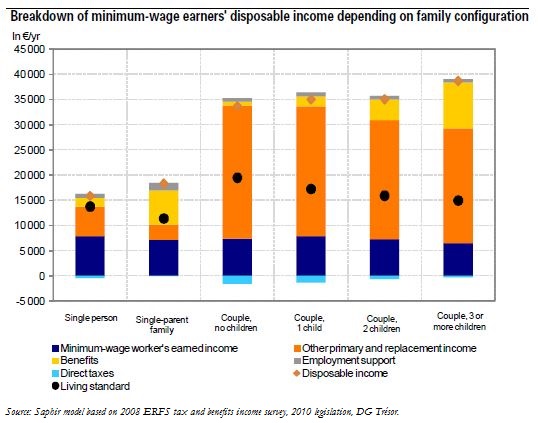Trésor-Economics No. 99 - Living standards of minimum-wage earners
Under French welfare and tax legislation, real disposable household income for workers on the "Smic" minimum-wage rose faster than the real minimum-wage, for a given family configuration and number of hours worked, between 1999 and 2011, with disposable income rising by over 10% against a 5% rise in the minimum-wage. Various mechanisms introduced to support low-earners' incomes have played a decisive role in this rise in disposable income.
In 2010, the average living standard of minimum-wage earners represented only two-thirds of the living standard of workers paid above the minimum-wage. This difference stems largely from the fact that the earned incomes of minimum-wage earners are lower than those of the other workers, especially since most work part time and are more likely to experience periods out of work during the year.
The French welfare and tax redistribution system boosts average living standards for minimum-wage earners by 8.5%. Ultimately, welfare benefits (family allowances, housing benefits, and income support) together with employment support schemes represent 12% of their disposable income.
Due to effects relating to redistribution and household composition, living standards of minimum-wage earners may vary greatly in the final analysis, indeed 30% of them belong in the top 5 living standards deciles. Among others, these differences stem from intra-year changes in their work situation (with periods out of work, for example), the composition of their household, and above all the contribution or otherwise of a partner's income. Livings standards of people on the minimum-wage living in a single-parent family are well below those of people living in a couple with no children, even if their earned incomes are similar.
Family configuration shapes not only the level but also the composition of minimum-wage earners' disposable income. For example, benefits take on greater importance–in terms of both amount and their share of minimum-wage earners' disposable income–in families with children than in families with none. For couples, the average size of welfare benefits increases with the number of children. The relative importance of employment support is small, on average, in comparison with other components of disposable income for minimum-wage earners, since they undergo periods of unemployment or because their household receives other income making them ineligible for these means-tested support mechanisms.
